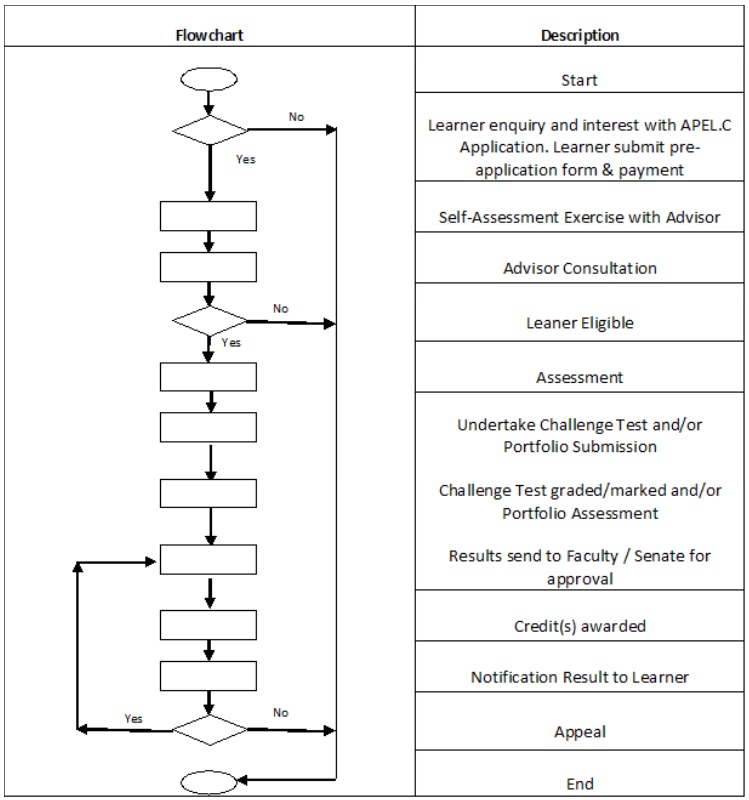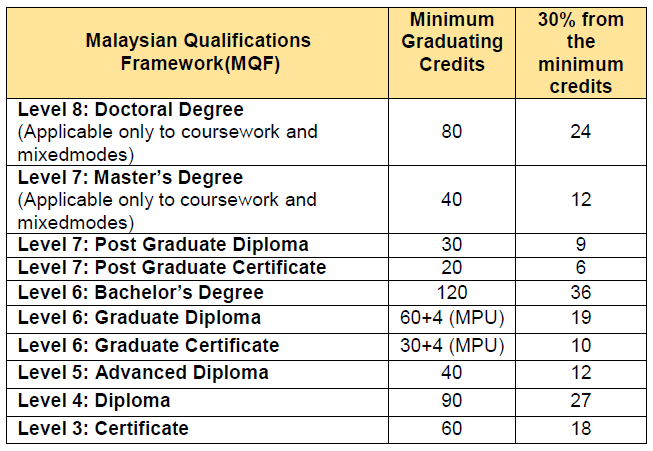WHAT IS APEL.C?
APEL.C is the award of credits through prior experiential learning towards a course in an accredited programme of higher education provider (HEP). APEL.C provides the mechanism to recognise the prior experiential learning of an individual that is relevant and specific to a course within a programme of study. The credit award is granted on the basis of the knowledge and skills acquired through informal and non- formal learning. These forms of learning which emphasise on experiential learning will need to be formally reviewed and assessed. The process will determine if learning has in fact occurred and is in line with the learning outcomes of the course(s) concerned. It is important to take note that it is the learning and not the experience of the learners which is being evaluated.
-
To provide recognition for learning acquired from non-formal and informal sources;
-
To reduce the duplication of learning, or learning of the same or similar content; and;
-
To encourage the participation of adults in higher education by recognising their prior experiential learning in the form of credits awarded.
ELIGIBILITY
The APEL.C provision is applicable to learners registered at North Borneo University College regardless of the mode of entry; whether through the conventional or APEL (A) route.
FEES
Application Fee – Processing fees of RM 450.00 per subject will be charged for processing process. The refund will be returned for learners that do not qualify for the self-assessment process. Fees paid are non-refundable once the learners are eligible for the assessment process.
Appeal Fee – Processing fees of RM 300.00 per subject will be incurred for the work involved in the appeal of the assessment result. Fees paid are non-refundable.
PROCEDURES FOR APEL.C APPLICATION: FOR LEARNERS

APEL.C Centre
North Borneo University College,
Wisma Angkatan Hebat, 1 Borneo, Jalan Sulaman,
88400 Kota Kinabalu, Sabah
Phone : 088-218 230 | Fax : 088-486249
APEL.C Policy
APEL.C are governed by the following principles:
-
Credit will only be awarded against the authenticated documentary evidence of learning and not for specific experiences. It is the achievement of outcomes of learning that is being recognized.
-
APEL.C is confined to courses in programmes that have obtained at least provisional accreditation from MQA.
-
The decision-making process and the outcomes of APEL.C claims will be transparent and demonstrably rigorous and fair.
-
APEL.C can be implemented for all areas and levels of qualifications in the Malaysian Qualifications Framework (MQF) except for final year project-based subject and dissertations. However, industrial training which includes practicum can be considered based on the suitability of the field. For the postgraduate level of study, the credit award is limited only to the courses in programmes conducted via coursework and mixed modes.
-
Courses that form part of the programme structure under professional bodies is subject to acceptance by relevant professional bodies. Faculties are responsible for the channel of the professional bodies’ information to APEL.C Centre.
-
Applications for APEL will be assessed to determine whether there is evidence of:
- Authenticity: Learners must demonstrate evidence of prior learning. Evidence might include a portfolio of work; a discipline-specific interview; completion of a set task; completion of the usual assessment for the course to which the prior learning is claimed to be equivalent; a reflective account or a diary of the learning achieved. The exact nature of the assessment should be decided in consultation with a University APEL.C Assessors who will follow MQA guidance.
- Relevance and Sufficiency: The evidence provided must be such that it indicates the learner has already achieved the learning outcomes for the courses for which award of credit is being sought.
-
APEL.C Administrator will communicate the decision clearly and promptly to the learner. If an APEL.C application is refused, the learner will be provided with a clear statement of the reasons as to why. For the learners who are not successful in the APEL.C assessment will have to complete the course through the usual process in their respective programme of studies.
-
It is vital that learners seeking APEL.C need to be aware of the amount of work that may be involved in claiming from the outset. GUC will be able to provide the learner with information about portfolio production (required content, structure, word length) on request, and also challenge tests or about any supplementary methods of assessment used. However, learners must realize that APEL.C is not an easy path and it requires the confidence and ability to work independently and that completion of a portfolio does not guarantee that credit will be awarded.
-
Learners may be advised to submit their applications for APEL.C during the first year of study.
-
Learners are responsible to obtain updates from the APEL.C Centre.
-
Learners are not allowed to apply for APEL.C for courses which the learner has already registered and undertaken during the period of study and cannot be used to retrieve a failed module.
Award of Credits
- The award of credits through APEL.C is in the form of credit transfer where it does not involve the transfer of grades. However, the credits awarded for the course will be counted towards the total credit requirement for graduation.
- For both Challenge Test and/or Portfolio Based Assessment, learners must achieve at least 50% of each course learning outcome.
- The course that has been awarded credit through APEL.C will appear in the transcript of the learner as ‘CT (APEL)’. It will not be taken into account in the calculation of GPA or CGPA. However, the credits will be counted towards the total credits required for graduation.
- GUC will issue the Malaysian Qualification Statement (MQS) as a supplementary document for learners who have been awarded APEL.C.
- Credits awarded through APEL.C can be transferred automatically to another programme within GUC if the course for which credits have been awarded through APEL.C has the same learning outcomes.
- The credits awarded must be equivalent to the credit value of the course applied for APEL.C. Award of partial credits will not be allowed.
- Credits awarded for a course are only applicable to the specific course applied for. Credits are not automatically apply to pre-requisites (if any) of the specific course.
- Assessment for credit award should be carried out separately for each course. *Credit award cannot be granted on a block basis. *Example – Assessment for Accounting (I) course should be made separately with Accounting (II)
- The maximum credit transfer allowed through APEL.C at various MQF levels is as follows:
- The maximum percentage of credit transfer through APEL.C is 30% of the total graduating credits of a specific programme of study. This percentage is in addition to the credit transfer provision based on the existing formal credit transfer policy. The maximum credit transfer allowed through APEL.C at various MQF levels.
Maximum credit transfer allowed through APEL.C at the various MQF levels


